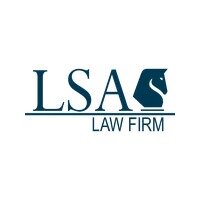Best Foreclosure Lawyers in Yerevan
Share your needs with us, get contacted by law firms.
Free. Takes 2 min.
Free Guide to Hiring a Real Estate Lawyer
List of the best lawyers in Yerevan, Armenia
About Foreclosure Law in Yerevan, Armenia
Foreclosure law in Yerevan, Armenia, relates to the process where lenders (usually banks or other financial institutions) recover the amount owed on a defaulted loan by selling or taking ownership (repossession) of the property securing the loan. The foreclosure process in Armenia commences when a borrower fails to make their loan payments. The laws surrounding foreclosure are governed by the Civil Code of the Republic of Armenia.
Why You May Need a Lawyer
Legal assistance in foreclosure processes can be crucial in many situations. If you are a homeowner facing foreclosure, a lawyer can advise you about your legal rights, explain available defenses to foreclosure, and possibly help you to keep your home. Foreclosure is a complex process and involves strict deadlines and detailed procedures that, if not correctly addressed, may result in losing your property. A lawyer can provide counsel on negotiating with the lender, explore options like loan modifications, or help to conduct a short sale or deed in lieu of foreclosure.
Local Laws Overview
In Yerevan, Armenia, the foreclosure process is under the jurisdiction of the civil court and begins with a notice served to the borrower and any other affected party. This notice begins a judicial foreclosure proceeding. The lender may opt for non-judicial foreclosure if the mortgage includes a power of sale clause. This power allows the lender to sell the property without court supervision. Potential inconsistencies or errors in the foreclosure process may serve as defenses in court, which is why understanding local laws is crucial.
Frequently Asked Questions
1. Can I stop the foreclosure process once it has begun?
Yes, in certain cases, foreclosure can be stopped or delayed by means such as negotiating modifications on your mortgage, filing for bankruptcy, or selling your home.
2. What happens after my property has been foreclosed in Yerevan, Armenia?
Following a successful foreclosure, the lender will sell the property. If the sale price fails to cover the remaining debt, the lender can sue you for the deficiency.
3. How will foreclosure affect my credit score?
Foreclosure could significantly lower your credit score and may hinder your ability to obtain new credit for several years.
4. Can I get my foreclosed home back?
In Armenia, getting your home back after a foreclosure is difficult. However, if the foreclosure procedure was faulty, you might be able to regain possession.
5. What is the difference between foreclosure and bankruptcy?
Foreclosure is a process where the lender takes possession of the property due to defaulting on a loan. Bankruptcy is a legal proceeding involving a person or business unable to repay their outstanding debts. Bankruptcy can delay or stop the foreclosure process.
Additional Resources
The Ministry of Justice of Armenia, and specifically, the Judicial Department, would provide you with more detailed information regarding foreclosures. Similarly, the Armenian Union of Consumers might offer advice and support to homeowners facing foreclosure. Online platforms like HG.org can also offer legal resources.
Next Steps
If you require legal assistance in foreclosure, consider hiring a local law firm specializing in real estate laws, particularly foreclosure proceedings. A lawyer will guide you through the legal maze, aid negotiations with lenders, represent you in court, if required, and evaluate judicial verdicts to ensure your rights are protected.
Lawzana helps you find the best lawyers and law firms in Yerevan through a curated and pre-screened list of qualified legal professionals. Our platform offers rankings and detailed profiles of attorneys and law firms, allowing you to compare based on practice areas, including Foreclosure, experience, and client feedback.
Each profile includes a description of the firm's areas of practice, client reviews, team members and partners, year of establishment, spoken languages, office locations, contact information, social media presence, and any published articles or resources. Most firms on our platform speak English and are experienced in both local and international legal matters.
Get a quote from top-rated law firms in Yerevan, Armenia — quickly, securely, and without unnecessary hassle.
Disclaimer:
The information provided on this page is for general informational purposes only and does not constitute legal advice. While we strive to ensure the accuracy and relevance of the content, legal information may change over time, and interpretations of the law can vary. You should always consult with a qualified legal professional for advice specific to your situation.
We disclaim all liability for actions taken or not taken based on the content of this page. If you believe any information is incorrect or outdated, please contact us, and we will review and update it where appropriate.










